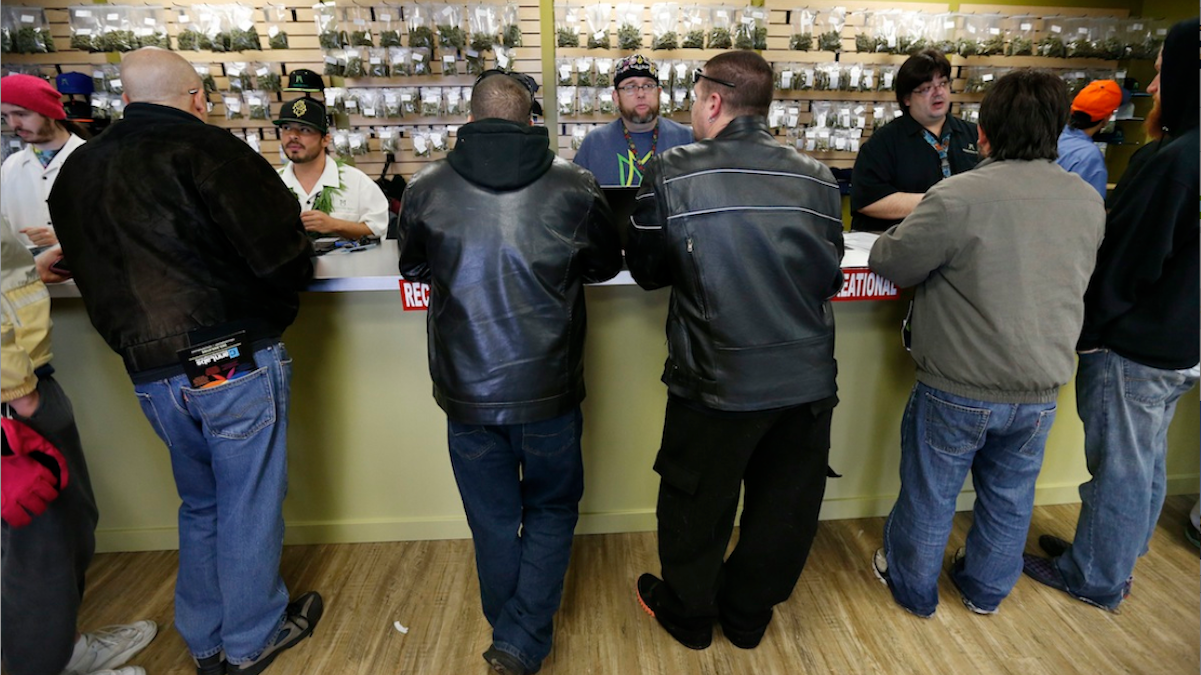Legalize marijuana? I don’t think so

Employees help customers at the crowded sales counter inside the Medicine Man marijuana retail store in Denver. But is legalization the best path? (AP Photo/Brennan Linsley, File)
Drug abuse doesn’t begin with a needle in one’s arm, like it reportedly ended for Oscar-winning actor Philip Seymour Hoffman. It begins with a cloud of marijuana smoke and a string of bad decisions.
This is not to say that every Justin Bieber will end up like Hoffman. But marijuana, like any drug, is a slippery slope. One that we, as a society, must tread carefully.
A few weeks ago, when Philadelphia City Councilman Jim Kenney introduced a bill that would decriminalize low-amount marijuana possession, allowing police officers to issue a summons requiring offenders to appear in a special program begun by District Attorney Seth Williams, it was a good decision.
Williams’ “Small Amount of Marijuana” program requires offenders to attend a three-hour drug-abuse class and pay a $200 fine. The slap on the wrist is aimed at moving 3,000 marijuana cases out of the main court system each year. And according to Kenney, his bill, if enacted, would free up 17,000 police hours spent processing marijuana offenders.
Both Kenney and Williams have laudable motives for moving those cases out of criminal court. If they save us money and free up police for the more important task of catching murderers and rapists, I support that.
But I also believe that marijuana use leads to more dangerous drugs.
Therefore, in addition to our focus on saving money, we must also focus on saving lives. Because whether or not we choose to believe it, drug addiction kills people, and addiction, like every deadly vice, often starts small.
I should know
That’s how it started for me.
The trip from marijuana to cocaine, and from cocaine to homelessness was swift and sure. The trip back was arduous and difficult, and though I’ve met with some success after nearly 18 years clean, the message I convey to my own children and to others, is that it’s better not to start in the first place.
While it’s true that everyone doesn’t react to drugs the way I did, for the millions who do, the downward spiral often begins with marijuana.
There are those who disagree. They routinely trot out studies that say marijuana is not a so-called “gateway drug.” They dismiss the many studies that espouse the opposite view. They wave off the rest of us as relics from a time gone by, and point to other cities in an effort to bolster their view.
A noticeable trend
No doubt there is a growing U.S. trend toward legalization and decriminalization.
Chicago approved a bill similar to Kenney’s that instituted a simple fine for marijuana possession.
Washington considered a bill that would drop the penalty to a $25 fine.
Colorado legalized recreational marijuana use.
And, in a statement that represented a seismic shift in societal attitudes, President Obama, while stopping short of endorsing legalization, told the New Yorker magazine he considered pot “a bad habit and a vice” like drinking.
But here’s the unvarnished truth: Drinking kills people, too. Just like cigarettes, and other so-called harmless drugs.
What to do?
The question, then, is “What should we do about drugs like marijuana?” A few common-sense answers come to mind.
We should we teach courses that discourage drug use before it begins. We should treat drug users who want to stop through the healthcare system, not prison. Most of all, we should wake up.
We should wake up to the fact that marijuana use is not a victimless crime. Just ask those who are buried in mass graves by Mexican drug cartels.
We should wake up to the fact that no drug addict starts out with a needle in his arm or a pipe in his mouth.
We should wake up to the fact that addiction often begins with marijuana before it comes to its inevitable end — jails, institutions, and death.
For those of us lucky enough to escape those kinds of ends, it’s wrong to remain quiet while society glosses over what we know to be the truth: Normalizing recreational marijuana use is a step in the wrong direction. It’s a step that may eventually cost someone his or her life.
WHYY is your source for fact-based, in-depth journalism and information. As a nonprofit organization, we rely on financial support from readers like you. Please give today.


